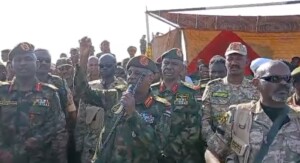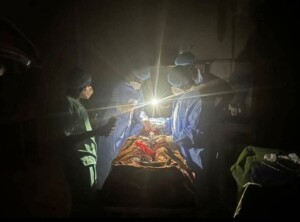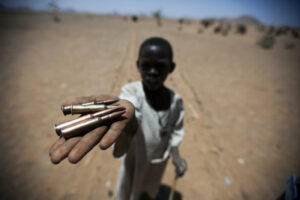At least one dead, two raped, 300+ injured in Sudan protest marches
Resistance Committees, doctors, lawyers, and activists have condemned the excessively violent response by the Sudan Armed Forces and associated paramilitaries, to the December 19 Marches of the Millions in the capital Khartoum on Sunday. At least one person died, more than 300 were wounded, while cases of rape and sexual violence have been reported, allegedly committed by paramilitaries.
 Protestors stream across the White Nile Bridge that links Omdurman with downtown Khartoum during Sunday’s Marches of the Millions (Photo: Sudanese Translators for Change @SudaneseTc)
Protestors stream across the White Nile Bridge that links Omdurman with downtown Khartoum during Sunday’s Marches of the Millions (Photo: Sudanese Translators for Change @SudaneseTc)
Resistance Committees, doctors, lawyers, and activists have condemned the excessively violent response by the Sudan Armed Forces and associated paramilitaries, to the December 19 Marches of the Millions in the capital Khartoum on Sunday. At least one person died, more than 300 were wounded, while cases of rape and sexual violence have been reported, allegedly committed by paramilitaries.
Sunday’s marches were convened by Resistance Committees across Sudan, to mark the third anniversary of the revolution that overthrew the 30-year Al Bashir dictatorship in 2019, and to express their rejection of the military coup d’état of October 25, and the subsequent political agreement, signed by coup leader Gen Abdelfattah El Burhan and Sudan’s Prime Minister Abdallah Hamdok.
Although major streets and bridges were initially blockaded by the military, mass protests bypassed the barriers and entered key points including the grounds of the Republican Palace in Khartoum.
The Khartoum North Resistance Committees strongly denounced the cases of sexual violence, saying that two young women protesters were raped. Other women were thrown from the Tuti Bridge, causing one of them to break her back.
The Resistance Committees said in a statement yesterday that one demonstrator was killed, more than 300 were wounded. A number of protesters went missing, and hundreds of them were detained.
The statement said that paramilitaries of the Rapid Support Forces and the Central Reserve Police (Abu Teira) surrounded the protesters in front of the Republican Palace, attacking them from all directions with live ammunition and tear gas, chasing fleeing people in the streets, and running over some with military vehicles, after cutting off the electricity.
Video: El Nour Abdallah / RD
The Forensic Physicians Syndicate asserts in a statement on Monday that indications from the previous processions and the December 19 Marches of the Millions, show that the security authorities used “types of nerve gas” to suppress the demonstrators in Khartoum.
The Syndicate reported that “quite a few protesters” complained about being repressed by heavy firing of liquefied gas, and showed “unusual and striking symptoms” such as respiratory and eye problems, effects on the nervous system, and lack of control over the bladder and the bowels.
The union called on international human rights institutions to support the right of the Sudanese people to a fair investigation of the serious human rights violations they are exposed to, through independent international investigation committees.
Darfur Bar Association
The Darfur Bar Association (DBA) on Monday confirmed several incidents of sexual violence against a number of young women by soldiers immediately following the December 19 marches in Khartoum.
The Darfur lawyers said in a statement on Monday that it had heard testimonies from some of the women victims and witnesses. According to the testimonies of some of the sexually assaulted women, the attackers threatened to open criminal reports against them for engaging in prostitution in order to force them to remain silent.
The DBA described the condition of the victims as bad. They said they were beaten with rifle butts and verbal abuse of their human dignity and robbed of their belongings as well.
The DBA saluted the courage of the raped and assaulted women who set out to pursue the perpetrators, and called on all those who were subjected to harassment and sexual violence not to remain silent and to join others in pursuing the perpetrators.
It stressed that the emergence of the phenomenon of rape indicates the development in the type of crimes committed against the revolutionaries, which makes joining the campaign to prosecute the perpetrators and those behind them the duty of all to prevent the perpetrators from impunity with deterrent punishment.
Doctors: Post-coup death toll at 46
The Central Committee of Sudanese Doctors reported on Monday the death of Mohamed Mahjoub, 28, after he was shot in the chest “as a result of the brutal repression the December 19 Marches of the Millions were subjected to in the East Nile area in Khartoum North, bringing the number of “our people’s martyrs” after the October 25 military coup to 46.
In a statement, the committee announced that 331 protesters were injured during the Marches of the Millions in the country on Sunday including two hit by bullets in the head, in addition to four other injuries to the eyes, with a case of finger amputation as a result of being hit by a stun grenade.
According to the committee, in its field report on the casualties on December 19, 253 demonstrators were wounded in Khartoum, including one hit to the head by live ammunition and three other cases of sound bombs.
In the processions in Omdurman, 29 other people were injured, including two cases of rubber bullets in the head and arm, and in Khartoum North 34 protesters were wounded.
The report confirmed the injury of six demonstrators in the demonstrations in eastern Sudan’s Kassala, including the injury of a sound bomb, which led to a fracture in the right hand, a fire, and laceration to the tissues of the shoulder, neck, face and left hand. This is in addition to five other cases of injuries in Kassala that led to burns with tear gas canisters.
The Unified Doctors Bureau said that the authorities practiced the most heinous violations by early dispersal of the Republican Palace vigil and the processions heading towards it, with live ammunition and massive tear gas fire at the crowds of protesters, chasing them to the entrances to hospitals, beating them and stealing their belongings.
The Doctors Bureau said in a statement that the authorities also carried out a complete siege and stormed a number of hospitals and fired tear gas canisters at their entrances, and called it “a clear violation of the right to health and the right to life itself, a behaviour that does not occur even in times of wars between fiercest enemies”.
The Sudanese Journalists Network (SJN) reported in a statement on Monday that many journalists were subjected to surveillance, harassment, beatings, and abuse by “the coup authorities” during their coverage of the processions and the December 19 vigil in front of the Republican Palace in Khartoum, on Sunday.
Azhari Mohamed Ali, one of the most prominent poets of the revolution, was assaulted by policemen during his participation in the December 19 processions in Khartoum.
He recounted the details of the attack on his Facebook page on Sunday evening, saying: “Today, during my participation in the December 19 Marches of the Millions, together with my relatives, I was subjected to a brutal attack by a group of Sudanese policemen and members of the [paramilitary] Central Reserve Police, after we crossed the Omdurman Bridge.”
The policemen “ran next to their vehicle, and [attempted to] strangle me with their flag. They beat me with their fists and batons and tore my clothes, while using hurtful and obscene expressions”.
The poet affirmed that “this revolution is victorious first in its ability to bring about change in all state institutions… especially the police, whose employees need to abide by at least a minimum level of professional and ethical standards.”
Forces for Freedom and Change (FFC)
The FFC Executive Office described Sunday’s demonstrations as “a milestone in the people’s struggle to defeat the coup and said that the masses set their goals to reach the Republican Palace despite the excessive violence”.
According to the FFC, Sunday’s demonstrations toppled the November 21 agreement between Gen Abdelfattah El Burhan, President of the Sovereignty Council, and leader of the October 25 coup, and Prime Minister Abdallah Hamdok.
The group will continue their work “to build the broadest united popular front to defeat the coup”. It will “support the continuous calls of the resistance committees to use all means of mass escalation, such as sit-ins, processions, disobedience and political strike, with our full commitment to helping create the broadest consensus around them between the forces for revolution and change”.











 and then
and then